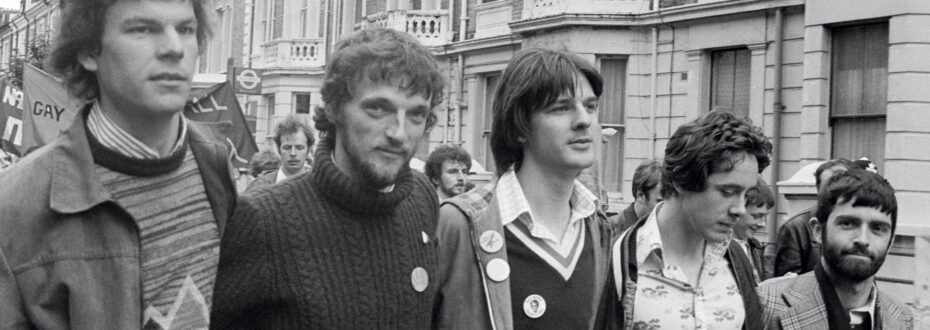By David Woodhead
The party’s theme is ‘come dressed as a banana’. I arrive late, having been to a Gay Soc Christmas Mince Pie and Mince, and I am much relieved that nobody has followed the instruction, although there is a guy carrying a five-foot inflatable with the word ‘Chiquita’ emblazoned on it, and another who has fashioned a hat out of several pounds of fruit from the local market.
The first person I bump into is a guy from my French literature class. ‘We’ve not seen much of you this term’, he says, ‘Victor Hugo misses you’. I pull up the sides of my mouth to approximate a smile, take a can of lager from the sink full of ice, and back out of the kitchen, hoping to find someone I know who isn’t going to remind me that since I came out last Spring, the allure of the library has been overridden by the charms of Old Compton Street.
There’s a DJ in the front room who’s playing Lisa Stanfield – she’s been around the world and still can’t find her baby – and then, in a moment of pure festive joy, the Communards. I move towards the centre of the room to dance, throw my hands in the air, and sing along. Don’t leave me this way. I then realise I am standing next to Kim, a psychology student I met at a party last June in New Cross, just after I had finished my second-year exams. She had been there with her housemate/best friend John, a six-foot two Morrissey lookalike, with whom I chatted all night about Thatcher and the poll tax, shared a passionate kiss, and gave my phone number.
Kim smiles and walks towards me, and pulls me out of the room, by my elbow, into the hallway.
‘How’s John?’, I ask. ‘I waited for his call’.
‘He died’, she says.
*
AIDS flourished in a climate of deep shame and fear, fuelled by the violent commentary of homophobic media and by authorities that variously ignored what was happening, or insisted that nothing should be done, or systematically excluded gay, bisexual and other men who have sex with men when they were most vulnerable. Section 28, for example, banned schools from even acknowledging lesbian and gay lives.
The much-lauded public education campaign ‘Don’t Die of Ignorance’, with its tombstones and lack of acknowledgement of same sex relationships, effectively blamed and isolated the people who most needed support. Community based organisations, like Healthy Gay Manchester and the Aled Richards Trust in Bristol, led the way in educating gay men in the face of the onslaught. By the mid-90s, with advances in medication, deaths started to fall.
The grief, personal and shared, was at times overwhelming. Some of us felt guilty for having survived.
AIDS changed our identities, altered our relationships, limited the sex we had, and shaped our expectations of what we could achieve and who we might be.
Those of us who survived are grateful, but the memories endure. We bore witness to the deaths of friends and lovers, and friends of lovers, and friends of friends. The grief, personal and shared, was at times overwhelming. Some of us felt guilty for having survived.
The scale of support offered, despite the tireless interventions of cutting-edge organisations like Terrence Higgins Trust and London Friend, could not meet the magnitude of the trauma we endured.
Taking a step back, we can see how these experiences contribute to the depression and anxiety some of us carry still, our struggles with substances and alcohol, as well as our long-term physical health challenges.
And whilst the prognosis for well-medicated HIV positive people now is much better – preventing disease progression and making infection impossible – hostility and stigma are still widely experienced, with potentially devastating consequences.
we can see how these experiences contribute to the depression and anxiety some of us carry still
Epidemics have long term social impacts, that much is clear. To reflect upon this painful chapter of history gives us strong clues about the challenges we face: pulling out of the Covid wreckage will take time. And its impacts on our mental health and wellbeing will be felt for many years to come.
Once we are out of the crisis, and we have caught our breath, the full horror of grief is likely to emerge. Anger at what we have lost will intensify. The legacy of our diminished relationships and restricted lives will surely take hold. Health care workers will set forth on the long road to conquering their exhaustion.
How we make sense of who we are and how we should live will be forever changed – just as it was for those gay men who came through the ’80s and ’90s.
Might we, therefore, listen to those who have survived a catastrophic pandemic before, to plan for the aftermath of this one? To understand the long-term mental health impacts of grief? The trick, after all, is to learn from history, not simply to repeat it.
AIDS Memory UK is campaigning to establish a UK AIDS Memorial in London.









